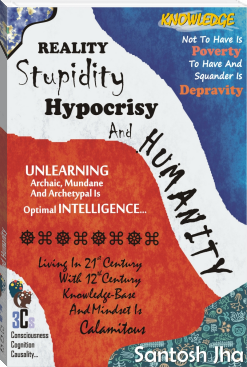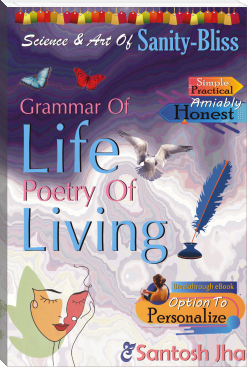Happiness Is A Scam, Santosh Jha [bill gates books recommendations txt] 📗

- Author: Santosh Jha
Book online «Happiness Is A Scam, Santosh Jha [bill gates books recommendations txt] 📗». Author Santosh Jha
Often, semantic conflations about a reality, especially in early childhood, create abstractions and confusion in perception and cognition about it. This confusion is quite usual as languages we speak, have inbuilt tendencies for conflation and confusion. Such confusions and abstractions are common with intangibles and multiple-emotion perceptions like love and happiness. We have already talked about how many realities have become ‘suitcase’ entities, packing so many different ideas into a ‘suitcase’ term. Like consciousness and love, happiness has also become a suitcase term. This happens in human world only as languages create and aggravate this suitcase conflation. We all know how there are words, which seemingly state our perception of our mental state. For example, there are terms like bad mood, depressed, negative feeling, down, de-motivated, disinterested, etc. One person using these different words to describe his or her mental state cannot truly be perceived by other in the same ‘perceptional veracity’, which the former meant. They are intangible situations and we can say, even the person saying these words may also not be sure what he or she meant to convey through these terms. From the point of view of body-brain mechanism; there is nothing like a ‘Sadness hormone’, like the happiness hormone, which is triggered to chemically transmit these emotions. All the above-mentioned emotional states are actually what the scientists call as ‘evolved emotions’. This means, they are ‘culturally-mediated’ shades of the core emotion of sadness. The sadness itself is not probably a true and innate emotional state. Sadness may actually be an antithesis of Happiness. If sadness was core emotion, the brain could produce a specific hormone like dopamine, which is referred as ‘happy hormone’. The reality is; evolution does not like a sad and depressed organism. A sad-depressed organism cannot be ‘driven’ optimally to lead its journey to survival and mating success. Evolution favored ‘Happy’ organisms and that is why it created ‘Happy Hormone’ and not a Sadness hormone. That is also probably why evolution designed the brain to forget, rather than remember. Sadness is just the lack of happiness and a summation of low-optimality body-mind state of the organism. However, this mechanism of happiness as lack of sadness and sadness as lack of happiness creates a confused cognition. We have already talked about how language owns much of the depravity and culpability in the scam humans live out. This creates troubles for perception. Many people complain, they are not being loved. They complain there is no love in their lives. They say, they don’t get their love reciprocated in the same measure and intensity. Same is the common perception about happiness. Much of this perception has got to do with its broad-based and abstracted perception. Happiness is a complex perception in human world. It is not the same, what it is in animal world, which could be put in a linear idea of survival sentimentality and reward feeling. Scientists probably are right in saying that the happiness in contemporary complex world has come to stay as ‘residual’ quotient of feeling pleasured minus feeling displeasured. It is not that there are not and cannot be number of ways to have pleasing feelings. The trouble is that the contemporary milieus are so complex, complicated, depraved, brutal and loaded with criminality and pilferage of goodness that proportion of displeasure is always exceeding pleasure. The trouble with most people is that first, they accept happiness in aggregate and are unable to segregate pleasure and pains to handle them without entering into mathematics of pluses and minuses. Secondly, most people calculate their pleasures and displeasures not in individual context but in collective context, aligned with society-politics-polity-economy. Much of the scammed perception about happiness is the trouble with average person. This scammed perception and processing of the reality of happiness makes happiness a very complex and abstracted idea. It is only natural that happiness does not get processed in the way, which could weed out the unnecessary and scammed ‘frills’ from the core reality of happiness.
Happiness, as perceived and lived out in contemporary human world seems to have become too erroneously synonymous to pleasure and that too of consumptive and actionable pleasures. As we said earlier, happiness is bound to be confused by similar terms and shades of realities like pleasure, bliss, joy, delight, entertainment, gratification, ecstasy, elation etc. The list of suitcase expressions is long. However, these similar terms have shades of the singular superordinate perception of the reality of feeling ‘rewarded’. As we have talked earlier; the dopamine has its own share of culpability in scamming the perception of the idea of happiness. It seems, in contemporary human societies and cultures; the dopamine bestowal of ‘reward’ has become more aligned to and skewed in favor of consumptive and consumable pleasures. As we talked earlier, happiness has also dominantly got aligned to ‘ritualistic’ aspects of action-behavior, which make people ape not true happiness but the frilled pleasures. Probably; the usually peripheral element of ‘thrill’ and rapturous exhilaration has come to stay as the core component of the cognition and acceptance of happiness. Somehow, this thrill element itself seeks ‘unfettered’ consumptive or behavioral freedom. This unfettered autonomy to have unlicensed excitement in all aspects and dimensions of life-living has probably overburdened the expectations from the reality of Happiness. The dopamine bursts at peak levels and nothing ‘less’ defining and benchmarking ‘happiness’ probably criminalizes the idea of happiness. This scams the reality of happiness. Such happiness is so very tough to come in contemporary world. Growingly, the human milieus are being restrictive and liberty is on the wane. The polity and economy are so constrained and pressured that they cannot entertain the level of freedom average person seeks for happiness. The constraints on individual liberty in fact create a propensity for more ‘unfettered’ behavior and actions. As it is denied and suppressed in contemporary human milieus; the average person feels more depressed, sad and un-pleasured. The happiness becomes more scammed. The related aspect of this scammed perception of happiness is that a large spectrum of small happiness has become subconscious happiness and they are not being registered and counted as happiness. These small happiness were a centuries back would have been big happiness as they would come only after much conscious struggles. A simple product like sugar and salt was not available to mass majority of people a century back. It would not come automatic, as it is now and for that a person hundred years back would have to struggle, make conscious choices and enter into a conflict with many to avail sugar or salt. That would register in this man’s mind, a hundred years back, as a definitive happiness. Contemporary men and women do not even think of counting sugar and salt as happiness, even when they over-consume both, many times more than even those who had it a hundred years back. In modern times, therefore, conscious happiness must enter into a struggle and conflict to get registered as definitive happiness. This comes when he or she conflicts with society and state power. Or, it comes when he or she enters into a domain, which involves risk, thrill, competitiveness and conflicts. This aspect of scammed perception of happiness must be factored in, in contemporary times of general prosperity but huge inequality in resources, incomes and power.
We have talked earlier about how every individual’s perception has become heavily ‘contextual’ to dominant and populist benchmarks of normal and appropriates. Our modern and contemporary knowledge of consciousness tells us that cognition and consciousness has a cyclical alignment. Consciousness shapes up the cognition and cognition creating persevered experiences and long-term memory, impacts consciousness. There are two very critical and superoridnate ‘contexts’ in modern human milieus of society-cultures-polity-economy, which makes conscious and definitive happiness a difficult proposition. These two contexts are huge deficit of ‘Trust’ and over-encompassing emaciation of ‘Dignity’. The brain’s own mechanism of feeling rewarded is almost constantly lacerated in everyday life-living of average men and women. The contexts of wider distrust and undignified life-living conditions and attitudes are huge dampener of reward sentimentality. Growing in-equitability, both socially and economically, undignified living conditions in heavily crowded, polluted and depraved big cities, livelihood and career stresses because of exploitative and inhuman conditions and treatments, insensitivities and suppressive propensities of governments, administration and law enforcement system, unpredictability and cunningness of commercial environment, growing distrust and undignified eventualities in relationships, etc are all installing dominant cognition of unpleasantness in consciousness of average men and women. This dampens and even kills the reward feelings of people. In reaction of this eventuality, most people conscientiously or unconscientiously alter their consciousness as they have to survive and succeed in such milieus of distrust and indignity. Their innate honesty, compassion, fraternity and amicability are sidelined and emaciated. Depravity and criminality take over. They are killers of reward feelings too. Growingly, Happiness in contemporary human cultures tends to come with enhanced risk and unpleasantness. This eclipses the shine and feel of lasting happiness. It has to be accepted that happiness or unhappiness (reward or punishing feelings) has a very large, yet un-registered inventory in a person’s subconscious or unconscious mind space. Science has established that the subconscious registers almost all small sensory signals and processes them as per their ‘emotional’ input. The conscious mind states may not register it. Like, we are all used to a milieu where there is loads of noise, pollution and abusive languages. We have become so used to them that we do not now register them consciously. We carry on with our routine work; very much like the trained driver; who drives a car but does not register the processes of driving consciously. However, the subconscious brain states are processing every small detail and that is why a person is driving the car successfully. Similarly, the subconscious brain states of limbic system, which handles all emotions and suitably signals hormonal response, are processing all small inputs of unpleasant sounds, killer polluted environment and disharmonious abusive languages, which emaciates homeostasis. The subconscious therefore stores loads of unpleasantness and unhappiness, which a person is not conscious of and aware of. This however affects his consciousness and cognition. The internal milieu of unhappiness alters the cognitive ‘context’ as it has stored short term memories of unhappiness and this unconsciously makes a person perceive external milieu and its normal situation with negative, unfavorable and unrewarding sentimentality. This subconscious unhappiness kills happiness situations and perceptions of rewarding probabilities.
We have talked earlier about how evolution worked its ways over billions of years to culminate into an organism as complex and as multidimensional as humans. Science tells us that Life of even a single cell organism in oceans, billions of years back, was itself too beautifully organized, capable and complex. If we look at a single cell, its bio-chemical complexity shall mesmerize it. We now know of reality far deeper and microcosmic than atoms and even particles. It is beyond human perception how an organism like humans, with 30 trillion cells and 35 trillion microbes in the body, works out a conscious life-living in reasonably organized and cooperative synchronization. It is known that even the microbes have their impact on subconscious choices we make and own. However, what we have now known with scientific precision that this massive plexus of cellular enormity survives and manages its life-living through a hugely complex and incessantly evolving mechanism called Homeostasis. Homeostasis is a chemically expressed and modulated, tangible internal milieu of body-brain system, which all 30-trillion cells of





Comments (0)